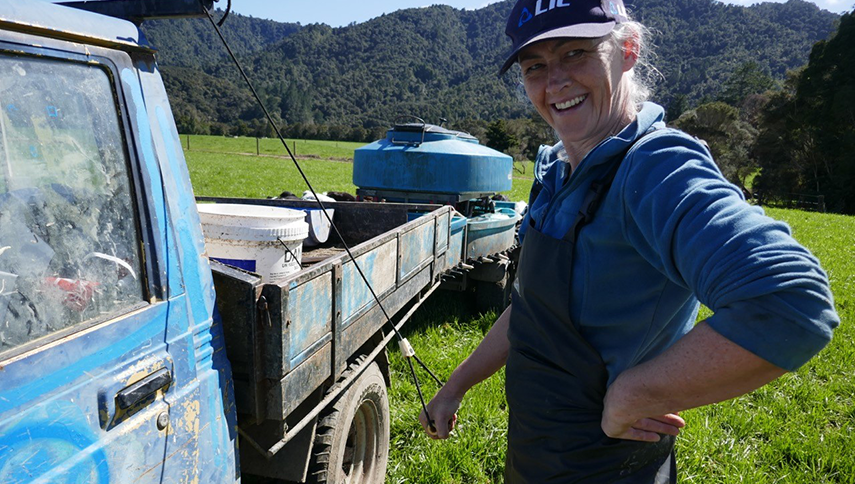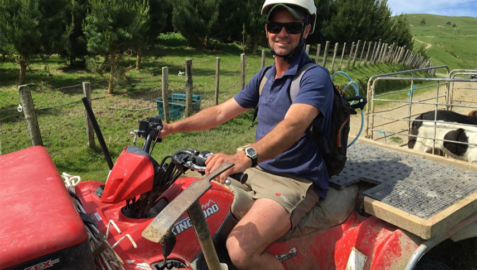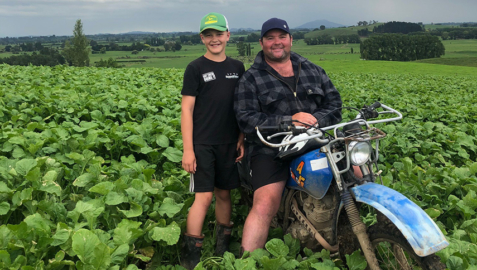
Circle of care
Module Overview
Tanya Sanders not only helps to run a 380-cow dairy farm in Northland, but also works as a GP locum in the area. She shared her insights about rural wellbeing.
Over the years, Tanya has attended enough Fieldays, ‘health hubs’ and other rural events to see what really helps farmers manage the ups and downs of farming. She acknowledges it’s been a big year for farmers in the region with drought, floods and Covid lockdown, on top of all the usual work demands. There are other pressures too she says.
“I think most farmers in Northland can manage Covid restrictions, floods and droughts, but many families are still struggling with the ongoing impact of M-Bovis, which tends to get forgotten. The other thing that’s often overlooked is what’s happening to the industry itself. Our occupational wellness. Changing regulations are stressful and have a big impact on us and our families. That’s what gets discussed most often over my kitchen bench,” she says.
Tanya says focusing on the big picture helps the couple get through the challenges.
“We can cope with things like floods and droughts because we know why we’re farming, and we understand time. Keeping that wider perspective really helps.”
The Five Ways to Wellbeing
Tanya is very familiar with the Five Ways to Wellbeing which Farmstrong promote to farmers (staying active, connecting with others, learning new things, giving back to the community and enjoying simple pleasures) Here’s how she puts the Five Ways into practice.
“I’m not a farmer. I’m a farm hand and calf rearer so I need to take care of my physical wellness when going from an office job to an outside one. I make sure I always use shoulder and back exercises to prevent injury.”
Tanya is also involved in the running of their farm and understands first-hand why learning is one of the Five Ways to Wellbeing. She says being a ‘reluctant office girl’ only served to create stress and cost money. “I needed to step up, stop complaining and learn new skills. I learnt these not only from industry business programmes and updates but from my farming friends and that helped me gain control of the situation.”
Like many farming women Tanya juggles on-farm duties like calving with work off-farm and childcare. “One thing that really helped me years ago was getting a good dog. It was tricky at our last farm to move calves. But then I got this dog which made such a difference to my day. It sounds a small thing, but it was so important. It was a point of stress, so I did something about it and suddenly I didn’t have the same dramas running round after calves with three young kids in tow.”
Tanya reckons “Getting off farm to recharge doesn’t have to be about holidays at the beach. Early in our time farming together that was impossible. We accepted ‘micro-breaks’ like a cup of tea or watching a game of rugby at a neighbour’s place. As our farming operation has evolved with time, we are now able to commit to a summer and winter break.”
In terms of staying connected, Tanya is a great believer in tapping into the power of local communities. “Instead of just talking about mental wellbeing generally, we actually need to connect as a farming community. When I’ve talked to young farmers at Fieldays, loneliness is a topic of interest. That’s where giving and connecting to your community helps. Whether it’s going along to a local function, or being a member of the bowling club and doing a Friday night dinner there. Staying well as a community is about supporting these community events as well as being part of creating them.”
“Top of my list are sport clubs. They’re a key source of connection for the farming community in this region. That’s why I worry about the centralisation of sport because once your local club is gone, it puts a huge hole into farming communities.”
The role of GP’s in the rural community
Tanya is also keen to improve understanding among local GPs about meeting the needs of the farming community. “Currently I’m involved in some research, with the plan to interview farmers and find out what it is they want so their doctors understand them as a group better and know how they can help them. For example, farming life is seasonal – different things happen at different times of year. So doctors calling farmers up for a cholesterol check during their busiest time is a waste of time.”
“GPs need to know what’s going on in farmers’ lives and also what resources there are to support them, such as the Rural Support Trust and Farmstrong. What are the resources that a GP can tap into when you’re lonely and working on a farm in an isolated place? Or if you’re so tired you don’t cook a meal and you’re eating Weetbix for dinner? Helping farming communities know where to get help and creating a circle of care is essential.”
“When you go to your GP for a yearly check-up, book for half an hour. Don’t just pop in for a quick update of your blood pressure and cholesterol. If you do that for 15 years and they’re always good, then you’ve done nothing to improve your health for 15 years. If you’re taking the time to get off farm and go into that waiting room, you may as well get a proper check. At different times of your life there are different risk factors. Get your skin checked, for example. Don’t rush the appointment, take the time to discuss things. Also, all farmers need to have a GP they know and trust, who understands their life situation and risks.”
Tanya’s overall observation is that the farming communities are resilient and resourceful and well-placed to look after their own needs. “Farmers should trust that they are the right people to be talking to each other about mental health. You don’t need to be an expert it’s about having humanity, not a degree.”


